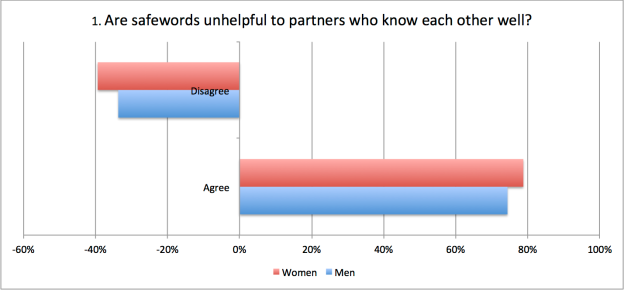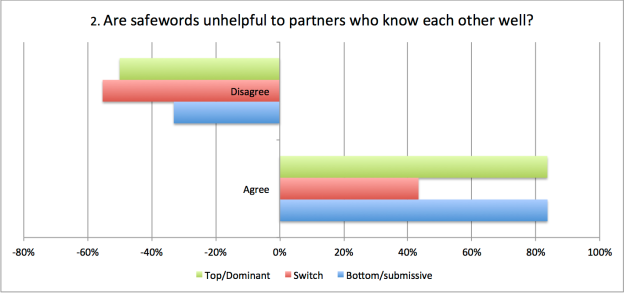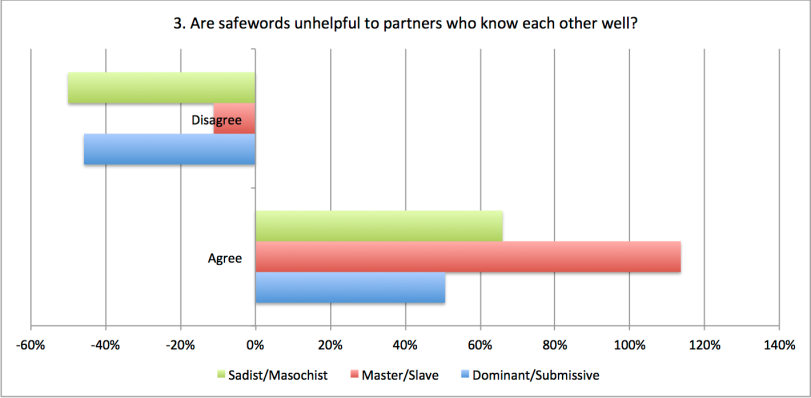 I guess this is the flipside to some of the attitudes revealed by my safeword survey – much of which shows a wide variety of attitudes to using safewords, from the more than 500 self-selecting people who responded.
I guess this is the flipside to some of the attitudes revealed by my safeword survey – much of which shows a wide variety of attitudes to using safewords, from the more than 500 self-selecting people who responded.
I found this Dutch/Belgian study on consent violations in BDSM really interesting. Here is what the author said on Fetlife:
Last month KinkyMinds held a survey on consent violations in the Dutch (speaking). Not just about the prevalence of consent violations, but also about how consent violations were experienced, where they took place, if they were considered abuse, about doubts about scenes by other people, interventions in scenes, and about party safewords.
The results are, though more nuanced than the results by the NCSF , with some understatement, quite shocking. Almost 65% of all respondents have at least experienced one consent violation. And that’s just one stunning figure.
Below you can find the final conclusions in English and Dutch.
The full 30 page report and analysis is probably more interesting than just this brief summary and contains a lot more analysis and explores many relations between key concepts. The report available for download (PDF) in Dutch and English the KinkyMinds website.
I wish to thank all the respondents for their time to answer the survey questions, and Pluu, Marijke and Nichi for proof-reading the draft version. Special thanks also to Voleuse for doing the reliability analysis. Without you, the report would have read like a wet newspaper. Of course, all responsibiliity for the report is mine and mine alone.
The author, Guilty, further commented:
What is the frequency of consent violations in the Dutch (language) BDSM scene?
Often. The idea that consent is absolute in the BDSM-scene doesn’t hold. Consent is very important, but at the same time, it gets violated on a pretty large scale. Almost 65% of the respondents have experienced at least one type of consent violation. There are significant relations with gender, orientation and experience. Consent clearly is the norm, but not always actual practice.
How are these consent violations experienced by those involved?
Not always equally bad. “Just” 14,6% has experienced at least one bad consent violation and 20,6% has ever experienced a consent violation as abuse. But there are many cases that are not experienced as bad. Women experience more consent violations as abuse than men. Still, only a very small part of the respondents considered filing charges or actually did so.
In this sense too, consent is less absolute than often suggested. It is violated quite regularly, but that´s not always bad. Still, a substantial part of the respondents has experienced a bad consent violation.
Considering the frequency of consent violations and the fact that such violations aren’t always bad, it is a valid question if consent as ultimate division between BDSM and abuse holds up. Consent violations, to some extent, seem to be part of the game. Not necessarily intended, but neither something to be prevented at all costs (which might not even be possible)
How often do people doubt the consensuality of other peoples’ scenes?
Almost a third (28,9%) has doubted consent in scenes of other people, and that tends to make them feel bad. Their concerns are not entirely unjustified. Of the total population 13% has experienced an ignored limit, 5,9% an ignored safeword and 11,8% a scene gone too far at a party. The idea that parties are the ultimate safe place for a first scene is need of some reassessment too.
How often is intervening in other peoples’ scenes considered? And: How often do we actually intervene in other people’s scenes?
A large part of the people who have doubted consent in scenes of other people, has considered intervening. Only a part of them has actually done so. Notifying a DM or asking participants if they are still okay are the most prevalent interventions. Only a minority directly intervenes themselves. But even many of those that do not intervene, tend to discuss the situation first with other people or a DM before deciding not to intervene. There is no massive bystander effect regarding doubts of consensuality.
Can a party safeword contribute to preventing consent violations and doubts about consensuality
A majority of the respondents (60%) is of the opinion that a party safeword can contribute to preventing consent violations. And 7,1% of the respondents has felt the need for such a safeword for themselves. On the other hand, most consent violation do not happen at parties. The victims of ignored safewords at parties are of course the main beneficiaries of a party safeword, but even amongst them “only” 30% has felt the need for a party safeword themselves.
We may conclude that a party safeword can contribute, but certainly will not prevent all consent violations. The question remains if that would be necessary and desirable, as not all consent violation are bad. They seem to be part of the game, and perhaps other attendees should do well to keep that notion in mind as well. It might well be that they experience a possible consent violation as worse than the participants themselves. Nonetheless, there is a case for a more active and attentive DM-policy, beyond introducing a party safeword.
Recommendations
Parties who wish to retain a profile as being safe would do well to consider introducing a party safeword and to uphold an active, albeit not overdone, DM policy regarding consent. Some additional publicity to attendees about what to do when you doubt consent might also help, as a substantial part seems to do nothing.
But we should not forget that the private sphere is a much bigger source of consent violations. More attention for such violations in the private sphere would certainly be necessary.
Finally, we should ask ourselves if consent as absolute demarcation between abuse and BDSM is still valid. Sometimes, by accident or not, limits are violated and this is not always experienced as bad. Perhaps it would be better to relate BDSM to some form of meta-consent. In general, there should be consent, and if things really get out of hand it becomes abuse, but where people play, accidents do happen.
 I’ve now done most of the articles I intend to write about the results of the safeword survey I did, details of which and links to articles are here.
I’ve now done most of the articles I intend to write about the results of the safeword survey I did, details of which and links to articles are here. to the homepage of this blog – belasarius.com. If you want to publish it with this image – that’s fine too.
to the homepage of this blog – belasarius.com. If you want to publish it with this image – that’s fine too.























